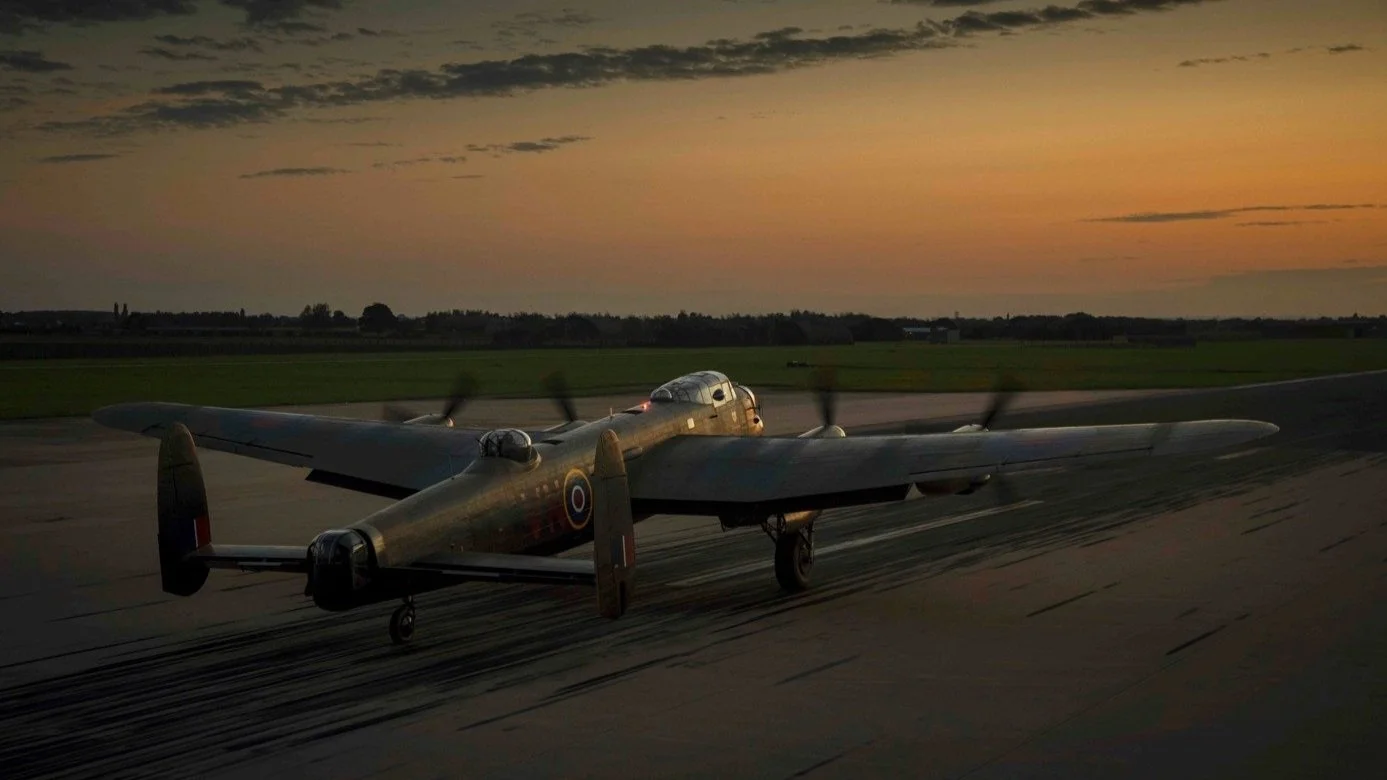Lancaster
The successor to David Fairhead and Anthony Palmer’s Spitfire proves to be something even more substantial and significant.
It was their 2018 documentary Spitfire which brought together David Fairhead and Anthony Palmer. The announcement that they had reunited to direct Lancaster suggested that this had been set up as a work in the same mould intended to match the success and style of the earlier piece. In the event, though, for all the echoes of Spitfire contained in it, Lancaster takes on a different character and emerges as a superior film. It retains many of the virtues of its predecessor, but it has a wider range and stands as a documentary record of unquestionable historical importance.
Spitfire was released to coincide with the centenary of the Royal Air Force and, by combining old footage with fresh interviews featuring survivors who had flown Spitfires, it emerged as a tribute to that plane and to those who had flown in her. In contrast to its predecessor, the Lancaster was designed in the early years of the Second World War with the intention of creating an aircraft suitable for mass bombing. It would play a key role in defeating Hitler but would also lead to serious questions about the way in which it was utilised to devastate German cities killing vast numbers of civilians in the process. Lancaster faces this issue from the outset starting out with comments from men now in their nineties who as young men flew in Lancasters. One of them looks back to the war years with pure nostalgia despite the horrors, another remembers his plane as possessing a living quality that spoke to him but the third is still unable to reconcile the positive and the negative, the Lancaster’s huge part in winning the war and the extent to which its bombs killed indiscriminately.
Lancaster's purpose is not to debate this in detail but to recognise both sides of the issue and to provide a summary of what the Lancaster achieved during the Second World War. The film is longer than Spitfire but justifies its length by covering so many aspects. Key to all of it and more important than the able commentary spoken by Charles Dance (who filled the same function in Spitfire) are the detailed personal recollections of the many participants featured here. They include, of course, pilots, air gunners and flight engineers, but we hear too from wireless operators, navigators and members of the Women's Auxiliary Air Force as well as comments by individuals from Canada, Australia, New Zealand and Jamaica. Late on there is also a contribution from a German civilian, Ursula Van Dam. Their contributions are combined with newsreels, operational films of Bomber Command, extracts from relevant cinema films (Target for Tonight, Journey Together, Flying with Prudence and Michael Anderson’s The Dam Busters) and new footage utilising the widescreen format to provide striking pictures of planes in flight (two Lancasters remain operational today). This blend, further honed since it was featured in Spitfire, is edited by David Fairhead in a masterly manner.
With due concern for viewers who may not be familiar with the events of the Second World War, Lancaster follows its general introduction with a reminder of how things stood in 1940, gives us details of how the Lancaster came to be designed, explains the layout of the aircraft and records how the first crews were trained and picked. Thereafter, while emphasising the teamwork of the crews, the film proceeds chronologically and, often incorporating detailed personal recollections, sketches in the main events associated with the Lancaster: the targeting of Cologne in 1942, the bombing of the Ruhr dams in 1943, the attack in the same year on Peenemunde (home to Germany's V2 rockets), a succession of raids on Berlin, the disastrous failure of the bid to strike Nuremberg in 1944 (ninety-six aircraft lost in a single night) and the notorious annihilation of the greater part of Dresden in 1945.
The cost of war, the suffering it entails, emerges clearly even if the majority of the participants accept that to defeat the Germans terrible actions were necessarily undertaken. Whatever the views expressed, the voices are significant in their authenticity and the value of that is undoubted. These are memories evidencing the outlook that those involved had to adopt in order to live through a war in which they knew that the odds of surviving were against them. The latter stages of the film go beyond the end of the war to touch briefly on how what had happened in Dresden brought Bomber Command into disrepute leading to a degree of ostracisation. Some criticisms are heard here aimed at its leader Bomber Harris but equally the once highly supportive Churchill is attacked over his change of attitude. Some might want more of this and, perhaps, less of the wartime footage but, if it would be impossible to please everybody to the full, Lancaster is never less than invaluable. At its close it features the memorial put up in London’s Green Park reminding us that its creation was a heartfelt project by survivors but not something in which the government was prepared to be involved.
MANSEL STIMPSON
Featuring Alan Biffen, Bill Gould, Bob Leedham, Tom Rogers, Charles Clarke, Neil Flanigan, George Dunn, Elizabeth Mortimer-Cook, David Fraser, Wendy Carter, Ernie Holmes, Betty Tring, Ursula Van Dam, Ron Mayhill, Jack Watson, Laurie Davis, Jack Dark, John Bell and Charles Dance as narrator.
Dir David Fairhead and Anthony Palmer, Pro David Fairhead, Anthony Palmer, Trevor Beattie, Gareth Dodds and Steve Milne, Ph Anthony Palmer and Iain Philpott, Ed David Fairhead, Music Chris Roe.
British Film Company/Haviland Digital/Trevor Beattie Films/Tall Boy Films-Sky.
110 mins. UK. 2022. UK Rel: 27 May 2022. Cert. PG.


